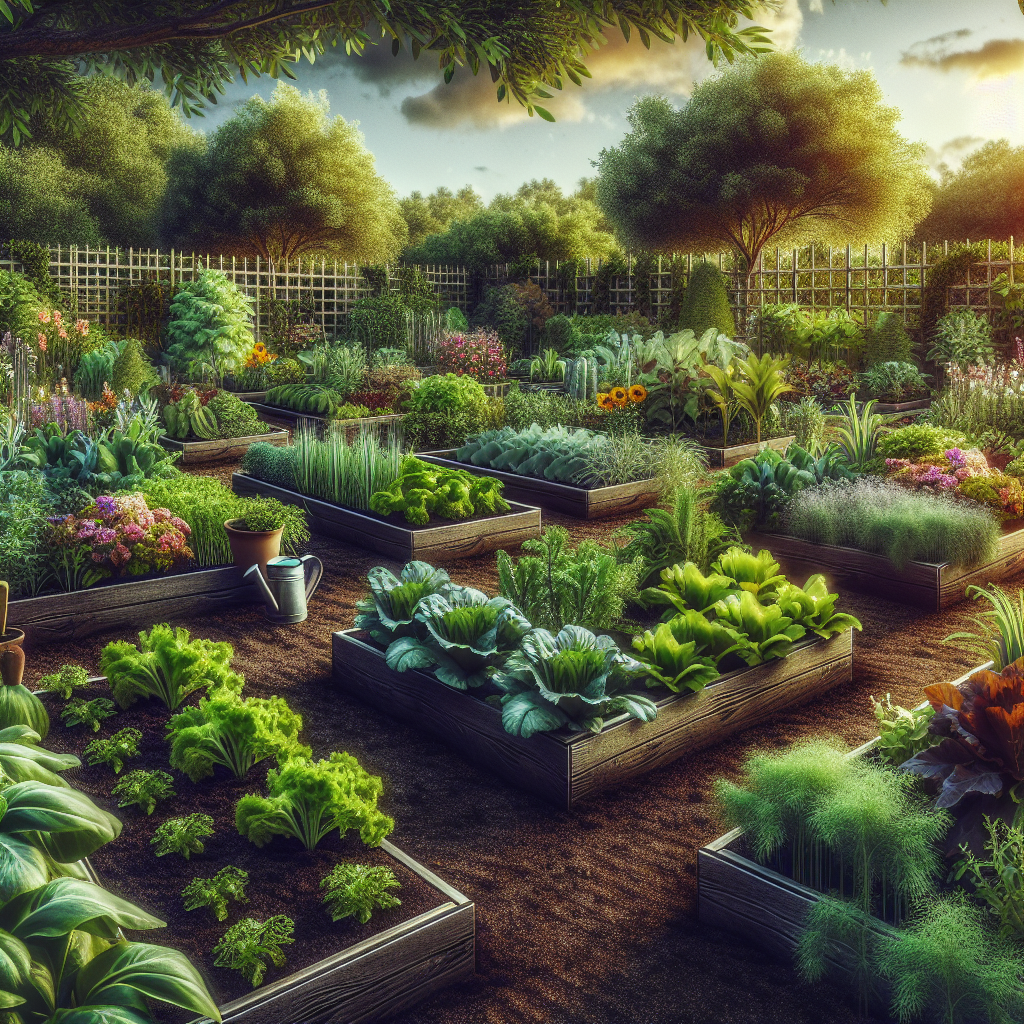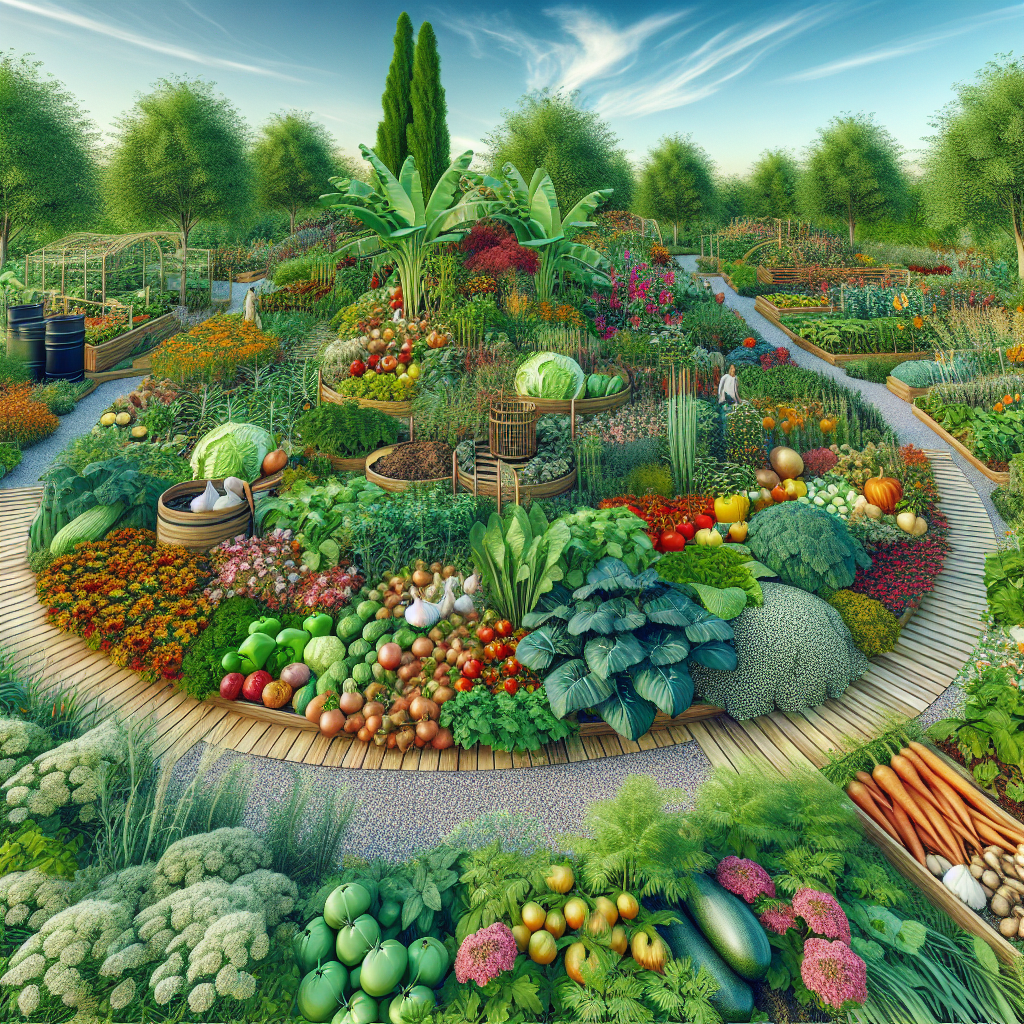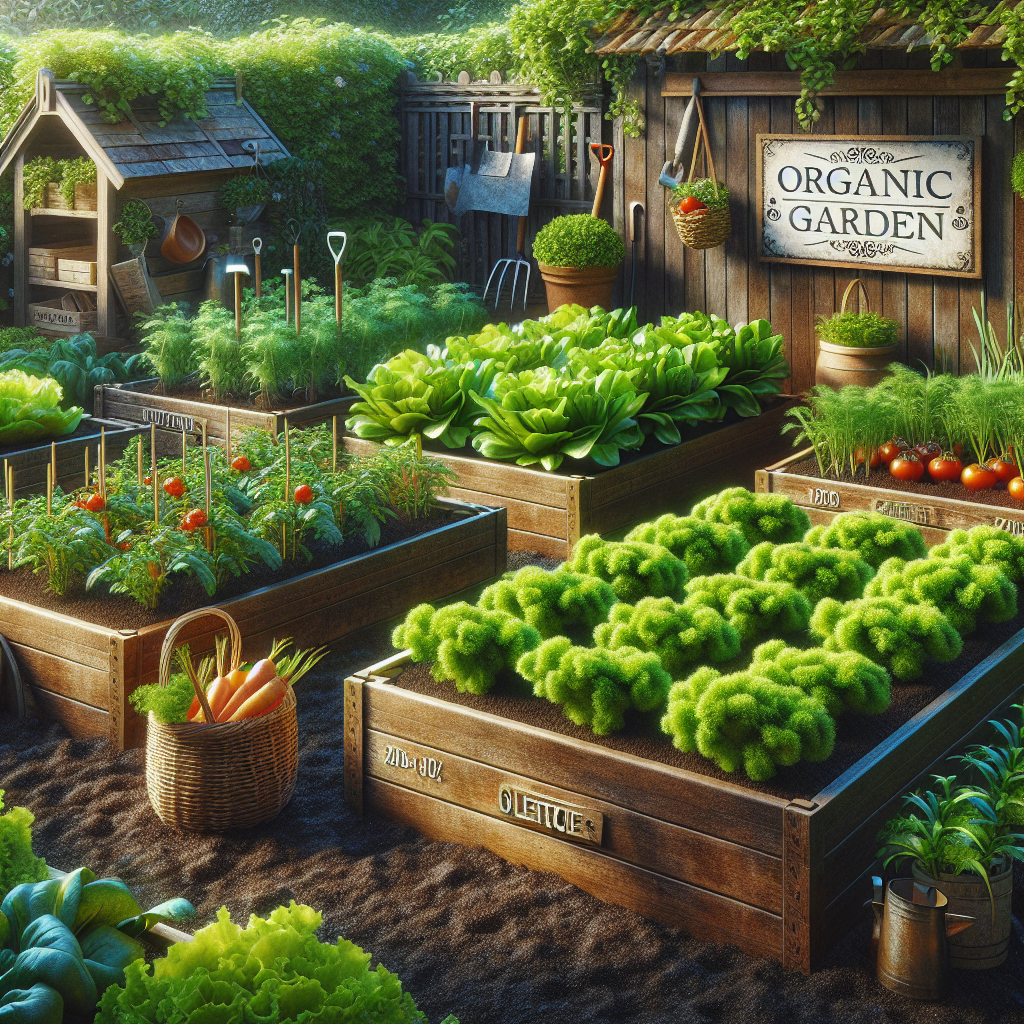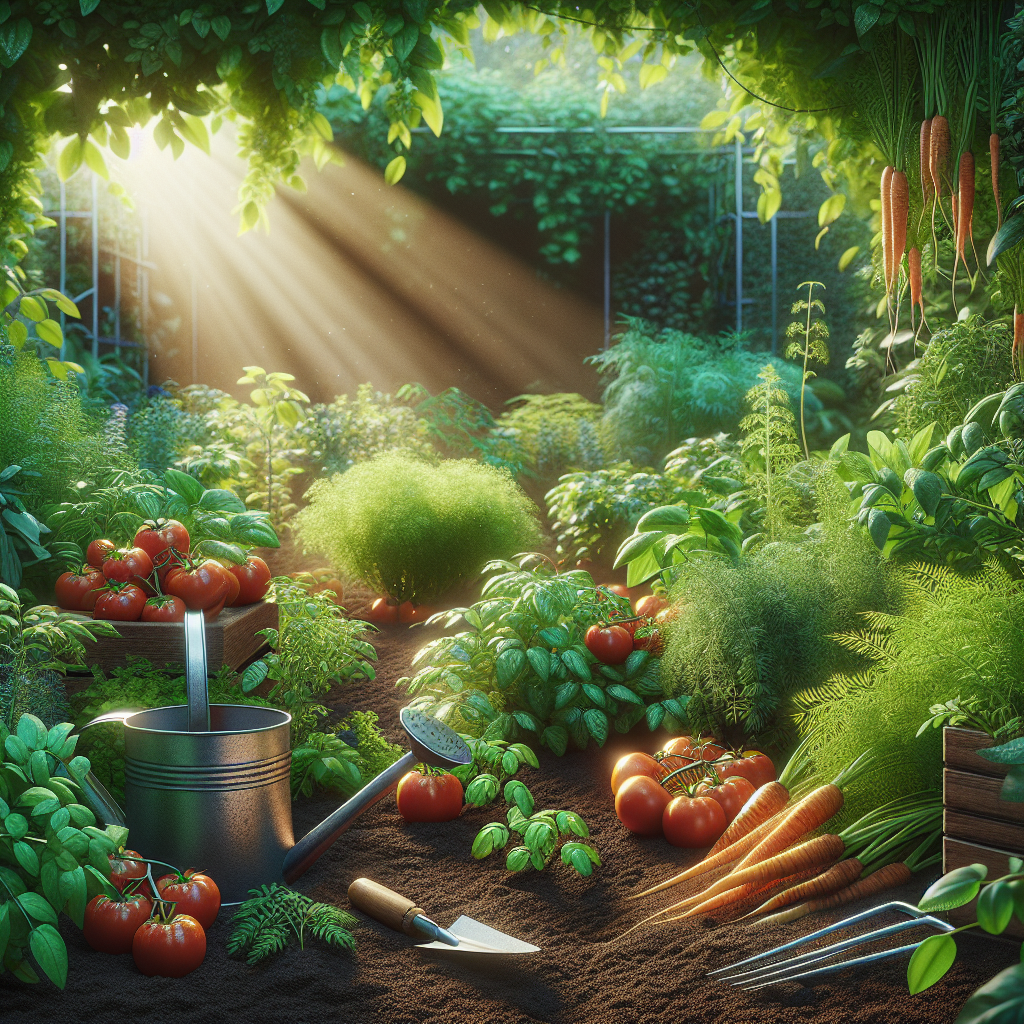Welcome to the world of organic gardening, where the focus is on nurturing the environment while growing your own bountiful harvest. As more people become aware of the benefits of sustainable practices, organic gardening has surged in popularity. This method eliminates the use of synthetic fertilizers and pesticides, ensuring that your plants grow in harmony with nature.
One of the key principles of organic gardening is to maintain healthy soil. Healthy soil acts as the foundation for healthy plants. By incorporating practices like composting and crop rotation, you can enrich the soil with essential nutrients and maintain its fertility. Understanding your soil type and its needs is the first step towards a thriving organic garden.
Organic gardening also emphasizes the importance of biodiversity. By planting a variety of crops and using companion planting techniques, you can create a balanced ecosystem that naturally deters pests and supports beneficial insects. This approach not only increases your garden’s productivity but also promotes a healthier environment.
Ready to dig deeper into the world of organic gardening? Visit our website to learn more and get started today! Click here.
Benefits of Organic Gardening

Diving into the practice of organic gardening offers a multitude of benefits that extend beyond just growing your own food. Here are some compelling reasons to embrace this eco-friendly approach:
- Healthier Produce: Organic gardening eliminates the use of synthetic chemicals, ensuring that your fruits and vegetables are free from harmful residues. This leads to healthier, more nutritious produce for you and your family.
- Environmental Sustainability: By avoiding chemical fertilizers and pesticides, organic gardening helps to reduce pollution and conserve water. It encourages the use of natural resources and promotes biodiversity, which is crucial for a balanced ecosystem.
- Soil Health: Organic practices such as composting and crop rotation enhance soil fertility and structure. Healthy soil is teeming with microorganisms that support plant growth and resilience, leading to more productive gardens.
- Cost-Effective: While the initial setup of an organic garden may require some investment, over time it can save you money. Making your own compost and using natural pest control methods reduces the need to purchase expensive chemicals and fertilizers.
- Community and Personal Well-being: Gardening has been shown to reduce stress and improve mental health. It also fosters a sense of community as gardeners often share tips, seeds, and produce with each other.
By understanding these benefits, you’ll be better equipped to appreciate the value of organic gardening and its positive impact on your life and the environment.
Composting for Healthy Soil
Composting is an essential practice in organic gardening, contributing significantly to the health of your soil and the vitality of your plants. By converting kitchen scraps and yard waste into nutrient-rich humus, you can create a sustainable, eco-friendly amendment for your garden. Here’s how to get started:
- Choose the Right Compost Bin: There are various composting systems available, from simple open piles to sophisticated tumblers. Choose one that fits your space and needs.
- Balance Your Ingredients: Successful composting requires a mix of ‘greens’ and ‘browns.’ Greens include nitrogen-rich materials such as fruit and vegetable scraps, coffee grounds, and grass clippings. Browns provide carbon and include leaves, straw, and cardboard. Aim for a balance of roughly 3 parts browns to 1 part greens.
- Aerate Regularly: Turning your compost pile helps to introduce oxygen, which is essential for the decomposition process. Aerate your pile every few weeks to speed up the breakdown of materials.
- Maintain Moisture Levels: Compost should be as moist as a wrung-out sponge. If it’s too dry, add water or more green materials. If it’s too wet, add more browns to absorb the excess moisture.
- Patience is Key: Composting is a gradual process that can take several months. Be patient and resist the urge to use your compost before it’s fully decomposed. Finished compost is dark, crumbly, and has an earthy smell.
Incorporating compost into your garden enriches the soil, enhances its structure, and promotes healthy root development. It’s a natural way to recycle organic waste and support a thriving garden ecosystem.
Companion Planting Techniques

Companion planting is a time-honored technique that involves growing different plants together to mutually benefit each other. This organic gardening strategy can enhance growth, deter pests, and improve yields. Here are some key companion planting techniques to consider:
- Three Sisters Planting: This ancient method involves planting corn, beans, and squash together. Corn provides a natural trellis for beans, beans fix nitrogen in the soil to benefit all three plants, and squash spreads along the ground to suppress weeds and retain moisture.
- Herb Companions: Aromatic herbs like basil, rosemary, and thyme can repel pests when planted near vegetables. For instance, planting basil near tomatoes can deter tomato hornworms, while enhancing the flavor of the tomatoes.
- Trap Cropping: Planting a sacrificial crop to attract pests away from your main crops is a smart defense strategy. Nasturtiums, for example, can attract aphids, keeping them away from more valuable plants like beans and tomatoes.
- Beneficial Flowers: Flowers like marigolds and nasturtiums can attract beneficial insects such as ladybugs and hoverflies, which prey on pests. Additionally, marigolds are known to deter nematodes in the soil.
- Mutual Support: Pairing plants that support each other’s growth can be highly effective. For instance, planting carrots and onions together helps to repel each other’s pests—carrot flies dislike the smell of onions, and onion flies are deterred by carrots.
By utilizing companion planting techniques, you can create a more resilient and productive garden. This holistic approach not only helps with pest control and nutrient cycling but also promotes biodiversity, making your garden a thriving ecosystem.
Natural Pest Control Methods

Organic gardening thrives on maintaining a balanced ecosystem, and natural pest control methods are essential to achieving this. Instead of resorting to chemical pesticides, consider these effective and eco-friendly approaches to keep your garden pest-free:
- Beneficial Insects: Introduce predators like ladybugs, lacewings, and predatory beetles into your garden. These insects feed on common pests such as aphids, mites, and caterpillars, helping to maintain a healthy balance.
- Diatomaceous Earth: This natural powder, made from fossilized algae, can be sprinkled around plants to deter a variety of pests including slugs, beetles, and ants. The sharp particles damage the exoskeletons of insects, causing them to dehydrate.
- Neem Oil: Extracted from the seeds of the neem tree, this oil acts as a natural insect repellent and pesticide. It disrupts the life cycle of pests, making it difficult for them to grow and reproduce. Neem oil is particularly effective against aphids, whiteflies, and spider mites.
- Companion Planting: Certain plants naturally repel pests. For example, planting marigolds can deter nematodes, while basil can keep mosquitoes and flies at bay. By strategically placing these plants in your garden, you can reduce pest populations.
- Homemade Sprays: Create your own pest control solutions using household ingredients. A mixture of water, dish soap, and a few drops of essential oils like peppermint or eucalyptus can repel insects. Another option is a garlic and chili spray, which can deter a wide range of pests.
- Physical Barriers: Use row covers, netting, or cloches to protect your plants from insects and larger pests. These barriers can prevent pests from reaching your crops while still allowing light and moisture to penetrate.
By adopting natural pest control methods, you not only protect your garden but also contribute to a healthier environment. These techniques are sustainable and promote biodiversity, ensuring that your garden remains a thriving, pest-free haven.
Water Conservation Tips

Water is a precious resource, especially in the context of gardening. Efficiently managing water usage not only helps conserve this vital resource but also promotes healthier plant growth. Here are some practical water conservation tips for your organic garden:
- Mulching: Applying mulch around your plants helps retain soil moisture, reduce evaporation, and suppress weeds. Organic mulches like straw, wood chips, and compost are excellent choices. They decompose over time, adding nutrients to the soil.
- Drip Irrigation: Unlike traditional sprinklers, drip irrigation systems deliver water directly to the plant roots. This minimizes water waste and ensures that plants receive the moisture they need. Drip systems can be easily set up and customized for different garden areas.
- Rainwater Harvesting: Collecting rainwater is an effective way to reduce reliance on municipal water supplies. Install rain barrels or larger cisterns to capture runoff from your roof. This water can then be used to irrigate your garden, reducing your water bill and conserving resources.
- Watering Schedule: Watering your garden early in the morning or late in the evening reduces evaporation losses. Additionally, watering deeply but less frequently encourages deeper root growth, making plants more drought-resistant.
- Soil Improvement: Enhancing soil structure with organic matter such as compost improves its water-holding capacity. Well-aerated soil absorbs and retains water more effectively, reducing the need for frequent watering.
- Plant Selection: Choose drought-tolerant plants and native species that are adapted to your local climate. These plants typically require less water and are more resilient to fluctuations in weather conditions.
Implementing these water conservation tips in your organic garden not only contributes to a sustainable environment but also ensures that your plants thrive with efficient water usage. *Visit our website to learn more and get started today! Click here.*
Subscribe to our newsletter to get information delivered to your inbox on homesteading, growing food, food preparation, travel, fishing, and more.











